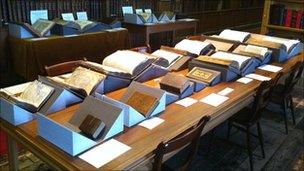World fame of Worcester Cathedral library
- Published

Worcester Cathedral's library is ranked among the most important in the country for medieval studies.
It contains nearly 300 manuscripts and archives dating from the 10th Century.
Librarian and archivist David Morrison said the cathedral's collection is invaluable and attracts scholars from all over the world.
He said: "Worcester's got the second best collection of medieval manuscripts in any cathedral in the UK and only Durham has a larger number."
The library and archives contain medieval manuscripts, maps, plans, drawings and books compiled by monks and the dean and chapter from the Middle Ages right through to the present day.
Mr Morrison said: "The monks collected manuscripts throughout the Middle Ages so they would have needed books for their own education.
"By the end of that time there would have been about 1,000 manuscripts so there would have been a huge amount of knowledge and wealth tied up in the libraries here."
The collection's highlights include the oldest surviving copy of the Venerable Bede's work on grammar and poetry, made in Canterbury Cathedral, dating back to the 10th Century.
Mr Morrison said: "Monks often swapped books from different monasteries and copied them."
The manuscripts have been carefully preserved over the centuries, a process which has been made easier by the methods the monks used.
Mr Morrison said: "Many of the books were written on calfskin using medieval ink which contains various ingredients including iron sulphate and oak apple gall.
"There's some kind of chemical reaction between the two and that's why it stays dark and gets darker over time if you look after it."
He also said it took one calf to produce three of four pages so a number of animals would have been needed just to make one manuscript.
It is thought each one would have been worth about two smallholdings of land.
Mr Morrison said the Worcester Antiphonal is one of the cathedral's most important manuscripts: "It's got all the music and all the services for every day of the year for the monastery.
"It dates to the year 1230 and is based on the Anglo Saxon master copy for England so, again, a very rare book."
Another important book is the Book of Psalms from 1200, which was produced at Worcester Cathedral and includes illustrations of gold leaf and precious stones.
Middle English
The library does not just contain Latinate manuscripts.
"One of the interesting things about the Worcester collection is there are several books in Middle English, including the Wycliffe New Testament - the first translation of the Bible into English produced between 1400 and 1450," said Mr Morrison.
The library does not just contain books - there is also a display cabinet containing items from King John's tomb.
Mr Morrison said: "We have King John's thumb bone which was taken by workmen from his tomb and also his will, which is the the only surviving medieval royal will left in the UK - it's an original not just a copy.
"There is also the famous Viking skin - the Vikings attacked Worcester in the 1000s and one was caught stealing the Sanctus bell, so he was flayed alive and his skin was stuck to the west door as a warning to other Vikings."
The library is an evolving collection of items and many of the cathedral's volunteers have helped uncover some of them, including Bible fragments dating from the 8th Century which were found in 1911.
Mr Morrison said: "Although everything's been catalogued there's always the chance to discover something new in a binding or perhaps in a section of a book, map, plan or drawing.
"I'm sure there's still things to discover in the bindings of the books round the walls."
- Published15 May 2011
- Published17 March 2011
- Published6 February 2011